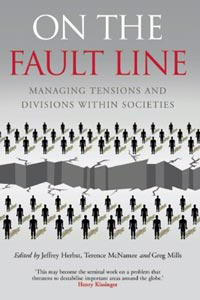On the Fault Line: Managing Tensions and Divisions Within Societies, a book co-edited by Colgate President Jeffrey Herbst, has received high praise from people such as Henry Kissinger and F. W. de Klerk in advance of its official launch March 1.
Published by Profile Books, the collection of essays examines “fault lines” within nations, which can lead to mass violence.
 Herbst and fellow editors Greg Mills and Terence McNamee explore this phenomenon in an attempt to answer why some countries can manage societal divisions while others are plunged into violence by these same kinds of fault lines.
Herbst and fellow editors Greg Mills and Terence McNamee explore this phenomenon in an attempt to answer why some countries can manage societal divisions while others are plunged into violence by these same kinds of fault lines.
Understanding why this happens is critical because, in today’s world, the primary situations in which people kill each other in large numbers is through internal conflict, rather than war between states.
Kissinger, the former U.S. secretary of state who is regarded as a foreign policy expert, is quoted as saying that On the Fault Line “may become the seminal work on a problem that threatens to destabilize important areas around the globe.”
An early review of the book in The Independent newspaper says that it offers a detailed and cogent analysis, case by case, as to how the promotion of democracy can help avert violent conflict.
De Klerk, the Nobel laureate and former South Africa president, said about the book: “As the impact of racial segregation and discrimination dissipates in South Africa, my country faces fresh challenges, including stark divisions in wealth and access to it. On the Fault Line is invaluable in guiding us through not only the management of such distinctions, but their eventual resolution.”
Herbst will be one of the speakers at the official launch of the book, which will be held just outside of Johannesburg, South Africa.
Other speakers at the event will be Joyce Banda, vice president of Malawi; Gen. Sir David Julian Richards, head of the British armed forces; and Jonathan Oppenheimer, an executive at De Beers who helped establish the Brenthurst Foundation, a forum that promotes sustainable economic growth in Africa.